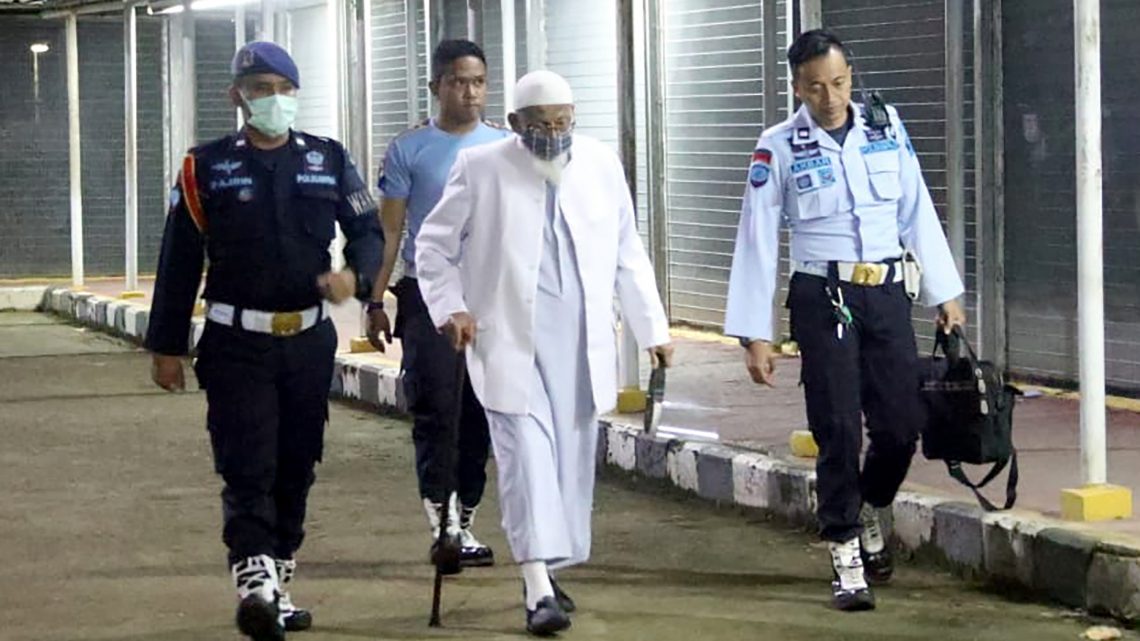
Suspected ‘Bali Bombings Mastermind’ Released From Indonesian Jail
January 8, 2021A radical Islamic cleric suspected of helping plot the horrific Bali bombings in 2002 was quietly released from prison in Indonesia early Friday and will enter a deradicalization program, a government spokesman said, prompting alarm over his potential influence on hardline groups.
Wearing a white robe, white cap and face mask, Abu Bakar Bashir left the Gunung Sindur maximum security prison, located south of the capital Jakarta, with his family and lawyers before sunrise.
Spokesperson Rika Aprianti, from Indonesia’s law and human rights ministry, said that Bashir was on his way back to his hometown of Sukoharjo in Central Java province, guarded by a high security entourage of counter-terrorism officers.
“Abu Bakar Ba’asyir has been released from Gunung Sindur prison today at 5.30[am],” the spokesperson said. The last-minute move was initially scheduled to take place during work hours but was abruptly changed to early morning, possibly to prevent his supporters from gathering.
Ahead of his release, his son Abdul Rohim told Reuters that his father would return to an Islamic boarding school which he founded in the 1970s, to conduct religious preaching.
The school’s graduates have strong militant ties and have been linked to attacks, according to the news agency.
“He has completed his term. This is purely over,” Rohim said.
Imprisoned in 2011, the 82-year-old is believed to be the spiritual leader of Jemaah Islamiyah, a transnational group with links to Al-Qaeda. He served a decade of a 15-year jail term for his involvement with a military training camp in Aceh province, but was released early with sentencing reductions.
Despite being behind bars for years, security experts have warned that Bashir’s influence and extremist ideology have not waned among supporters.
Counterterrorism officials have linked him to the 2002 Bali bombings that killed 202 people and an attack at a hotel in Jakarta the following year. But Bashir was never convicted for them and denied involvement.
Many of the victims of the 2002 attacks were Australian tourists on vacation in Bali.
Australian Prime Minister Scott Morrison said Friday that while he respected the decision by the Indonesian judiciary, the news of Bashir’s release was “distressing.”
"It's sometimes not a fair world. It doesn't make it any easier for any Australian to accept that,” Morrison said.
Foreign Minister Marise Payne echoed Morrison’s views, saying in a statement that while Australia respected Indonesia’s “sovereignty and the independence of its judiciary,” those involved in the Bali bombings should face “tough, proportionate and just sentences.”
Indonesia has expanded its efforts to crack down on Islamist groups operating in the Muslim-majority country. A senior member of JI was arrested last month, as was a cleric leading the hardline local organization the Islamic Defenders Front, which was just banned.
Concerns linger over Bashir’s influence in extremist circles. He pledged allegiance to the Islamic State while behind bars in Indonesia, and there was little information available about what his deradicalization program would entail.
In an interview with Al-Jazeera, a member of Jemaah Islamiyah who claimed to have lived with Bashir in Malaysia said that he still has a strong presence.
“Bashir believes in armed jihad and still has a very strong influence in Indonesia, that’s why the Indonesian government is so scared of him. One word from him and all his followers will rise up.”

